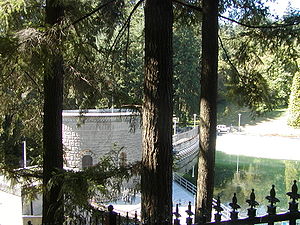Portland City Reservoirs: Difference between revisions
m (cat) |
Khris.soden (talk | contribs) m (Added a couple of links) |
||
| (One intermediate revision by one other user not shown) | |||
| Line 1: | Line 1: | ||
[[File:Washington Park Reservoir 4.JPG|right|300px|thumb|Reservoir #4, Washington Park]] | |||
The '''Portland City Reservoirs''' date from between 1894 and 1911. | The '''Portland City Reservoirs''' date from between 1894 and 1911. | ||
Reservoirs #3 and #4 are located in [[Washington Park]], and Reservoirs #1, #5 and #6 are on the east and south sides of [[Mount Tabor]]. The rectangular #6 is the largest, with a long-dormant fountain reactivated in 2007. There's a reservoir #7, a smaller underground tank near Mount Tabor's summit, still part of the system. | Reservoirs #3 and #4 are located in [[Washington Park]], and Reservoirs #1, #5 and #6 are on the east and south sides of [[Mount Tabor]]. The rectangular #6 is the largest, with a long-dormant fountain reactivated in 2007. There's a reservoir #7, a smaller underground tank near Mount Tabor's summit, still part of the system. | ||
The former Reservoir #2 stood northeast of the corner of SE 60th Avenue and Division before it was decommissioned in the 1980s; its distinctive pumphouse is a private single-family residence, and an entire residential development stands in the depression. | The former Reservoir #2 stood northeast of the corner of [[SE 60th Avenue]] and [[SE Division Street|Division]] before it was decommissioned in the 1980s; its distinctive pumphouse is a private single-family residence, and an entire residential development stands in the depression. | ||
Four of the reservoirs were done in Ernest Ransome's patented reinforced-concrete system, so early they were considered experimental at the time. The rounded pumphouses, which look like rough medieval stonework, are poured concrete etched to look like stone. They're listed on the National Register of Historic Places. | Four of the reservoirs were done in Ernest Ransome's patented reinforced-concrete system, so early they were considered experimental at the time. The rounded pumphouses, which look like rough medieval stonework, are poured concrete etched to look like stone. They're listed on the National Register of Historic Places. | ||
Latest revision as of 11:15, 24 October 2011

The Portland City Reservoirs date from between 1894 and 1911.
Reservoirs #3 and #4 are located in Washington Park, and Reservoirs #1, #5 and #6 are on the east and south sides of Mount Tabor. The rectangular #6 is the largest, with a long-dormant fountain reactivated in 2007. There's a reservoir #7, a smaller underground tank near Mount Tabor's summit, still part of the system.
The former Reservoir #2 stood northeast of the corner of SE 60th Avenue and Division before it was decommissioned in the 1980s; its distinctive pumphouse is a private single-family residence, and an entire residential development stands in the depression.
Four of the reservoirs were done in Ernest Ransome's patented reinforced-concrete system, so early they were considered experimental at the time. The rounded pumphouses, which look like rough medieval stonework, are poured concrete etched to look like stone. They're listed on the National Register of Historic Places.
Portland's reservoirs remain uncovered, which is against EPA standards. Recent word is that those standards may be relaxed, which would save Portland a good deal of money.